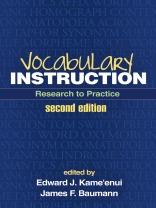This highly regarded work brings together prominent authorities on vocabulary teaching and learning to provide a comprehensive yet concise guide to effective instruction. The book showcases practical ways to teach specific vocabulary words and word-learning strategies and create engaging, word-rich classrooms. Instructional activities and games for diverse learners are brought to life with detailed examples. Drawing on the most rigorous research available, the editors and contributors distill what Pre K-8 teachers need to know and do to support all students’ ongoing vocabulary growth and enjoyment of reading.
New to This Edition
*Reflects the latest research and instructional practices.
*New section (five chapters) on pressing current issues in the field: assessment, authentic reading experiences, English language learners, uses of multimedia tools, and the vocabularies of narrative and informational texts.
*Contributor panel expanded with additional leading researchers.
قائمة المحتويات
Introduction
1. Context for Vocabulary Instruction,
Edward J. Kame’enui and
James F. Baumann
I. Teaching Specific Vocabulary
2. Direct and Rich Vocabulary Instruction Needs to Start Early,
Margaret G. Mc Keown, Isabel L. Beck, and
Cheryl Sandora
3. Teaching Vocabulary in the Primary Grades: Vocabulary Instruction Needed,
Andrew Biemiller
4. Vocabulary Instruction for Young Children at Risk of Reading Difficulties: Teaching Word Meanings during Shared Storybook Readings,
Michael D. Coyne, Ashley Capozzoli-Oldham, and
Deborah C. Simmons
5. Young Word Wizards!: Fostering Vocabulary Development in Preschool and Primary Education,
Katherine A. Dougherty Stahl and
Steven A. Stahl
II. Teaching Vocabulary-Learning Strategies
6. Teaching Prefixes: Making Strong Instruction Even Stronger,
Michael F. Graves, Melanie Ruda, Gregory C. Sales, and
James F. Baumann
7. The Vocabulary–Spelling Connection and Generative Instruction: Morphological Knowledge at the Intermediate Grades and Beyond,
Shane Templeton
8. Teaching Word-Learning Strategies,
James F. Baumann, Elizabeth Carr Edwards, Eileen Boland, and
George Font
III. Teaching Vocabulary through Word Consciousness and Language Play
9. Developing Word Consciousness: Lessons from Highly Diverse Fourth-Grade Classrooms,
Judith A. Scott, Tatiana F. Miller, and
Susan Leigh Flinspach
10. Keep the “Fun” in Fundamental: Encouraging Word Consciousness and Incidental Word Learning in the Classroom through Word Play,
Camille L. Z. Blachowicz and
Peter Fisher
11. Language Play: Essential for Literacy,
Dale D. Johnson, Bonnie Johnson, and
Kathleen Schlichting
IV. Special Topics in Vocabulary Instruction
12. Vocabulary Assessment: Making Do with What We Have While We Create the Tools We Need,
P. David Pearson, Elfrieda H. Hiebert, and
Michael L. Kamil
13. Reading and Vocabulary Growth,
Anne E. Cunningham and
Colleen Ryan O’Donnell
14. Powerful Vocabulary Instruction for English Learners,
Patrick C. Manyak
15. Using Multimedia to Support Generative Vocabulary Learning,
Jill Castek, Bridget Dalton, and
Dana L. Grisham
16. What Differences in Narrative and Informational Texts Mean for the Learning and Instruction of Vocabulary,
Elfrieda H. Hiebert and
Gina N. Cervetti
عن المؤلف
Edward J. Kame’enui, Ph D, is Dean–Knight Professor Emeritus, Associate Dean for Academic Affairs, and Founding Director of the Center on Teaching and Learning in the College of Education, University of Oregon. He was founding Commissioner of the National Center for Special Education Research in the Institute of Education Sciences. His research interests include instructional design, vocabulary development and instruction, and learning disabilities.
James F. Baumann, Ph D, is the Chancellor’s Chair for Excellence in Literacy Education Emeritus at the University of Missouri–Columbia. A former elementary school teacher, Dr. Baumann was editor of
The Reading Teacher, served on the Board of Directors of the International Reading Association and the Literacy Research Association, and is a member of the Reading Hall of Fame. His research interests include elementary reading instruction, vocabulary teaching and learning, and teacher inquiry.












